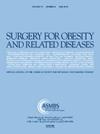谁能从代谢和减肥手术中获得最多生活质量方面的益处:前瞻性 REBORN 队列研究的结果
IF 3.5
3区 医学
Q1 SURGERY
引用次数: 0
摘要
根据代谢和减肥手术(MBS)患者术后可能获得的益处确定其优先顺序至关重要。目的:研究不同资格的患者在术后最初一年中生活质量(QoL)的变化,并确定哪一组患者能获得更大的益处。加拿大蒙特利尔北岛健康与社会服务综合大学中心(CIUSSS-NIM)。我们根据肥胖程度和是否存在合并症将患者分为三组:第 1 组(无合并症的 II 类肥胖,n = 28);第 2 组(有合并症的 II 类肥胖,n = 36);第 3 组(III 类肥胖,n = 460)。在手术前 6 个月、手术后 6 个月和 12 个月测量了 QoL(短式 QoL 问卷 [SF-12])和人体测量学指标。重复测量混合模型显示,对于 QoL 的身体部分,时间具有显著的主效应(< .001),时间与组别之间存在交互作用(= .007)。在 QoL 的心理因素方面,时间与组别之间没有交互作用 ( = .402)。体重和体重指数之间存在明显的交互作用(P<0.001),第三组比第一组或第二组减重更多。随着时间的推移,接受心理健康教育的所有组别在身体方面的 QoL 和体重都有所改善,即使是那些传统上被认为不符合心理健康教育条件的组别(即第 1 组)也是如此。这为我们提供了一个起点,以探讨不因体重和并发症状况而将患者排除在外的重要性,以及制定全面的资格标准的重要性,这些标准包括所有可能受益于 MBS 的患者,而不仅仅是体重减轻的患者。本文章由计算机程序翻译,如有差异,请以英文原文为准。
Who gains the most quality-of-life benefits from metabolic and bariatric surgery: findings from the prospective REBORN cohort study
Prioritizing patients for metabolic and bariatric surgery (MBS) based on their potential postoperative benefits is essential. To examine changes in quality of life (QoL) during the initial postoperative year among patients with diverse eligibility statuses and determine which group experiences greater benefits. Center intégré universitaire de santé et de services sociaux du Nord-de-l'Île-de- Montréal (CIUSSS-NIM), Canada. We categorized patients into 3 groups based on obesity class and the presence of comorbidities: Group 1 (obesity class II without comorbidities, n = 28); Group 2 (obesity class II with comorbidities, n = 36); and Group 3 (obesity class III, n = 460). QoL (Short-Form QoL questionnaire [SF-12]) and anthropometrics were measured at 6 months before, and 6 and 12 months after surgery. Repeated measures mixed models revealed a significant main effect of time ( < .001) and an interaction between time and group for the physical component of QoL ( = .007). These indicated consistent improvements across time in all groups, with the greatest benefits seen in Group 3 relative to Group 1. There were no interactions between time and group for the mental components of QoL ( = .402). There were significant interaction effects for weight and BMI (p’s < .001), with Group 3 losing more weight than Groups 1 or 2. All groups that underwent MBS had improvements in the physical aspects of QoL and weight over time, even those who have traditionally not be considered eligible for MBS (i.e., Group 1). This provides a starting point to explore the importance of not excluding patients due to their weight and comorbidity status and setting comprehensive eligibility criteria encompassing all patients who might benefit from MBS, beyond just weight loss.
求助全文
通过发布文献求助,成功后即可免费获取论文全文。
去求助
来源期刊
CiteScore
6.70
自引率
12.90%
发文量
570
审稿时长
56 days
期刊介绍:
Surgery for Obesity and Related Diseases (SOARD), The Official Journal of the American Society for Metabolic and Bariatric Surgery (ASMBS) and the Brazilian Society for Bariatric Surgery, is an international journal devoted to the publication of peer-reviewed manuscripts of the highest quality with objective data regarding techniques for the treatment of severe obesity. Articles document the effects of surgically induced weight loss on obesity physiological, psychiatric and social co-morbidities.

 求助内容:
求助内容: 应助结果提醒方式:
应助结果提醒方式:


